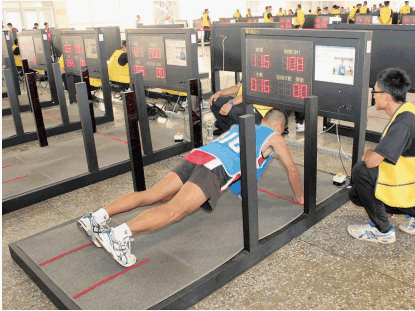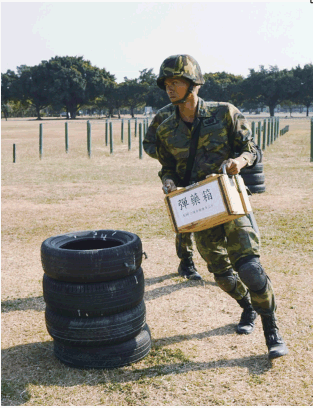- Minister's Foreword
- Introduction
- Part 1. Strategic Environment
- Part 2. National Defense Policy
- Chapter 3. National Defense Policy Plans
- Chapter 4. National Defense Policy Implementation
- Section 1. Enhance Force Buildup Efforts
- Section 2. Devise Well-planned Transformation of Military Service
- Section 3. Reform to National Defense Legal System
- Section 4. Safeguard Military Human Rights
- Section 5. Expand Military Exchanges
- Section 6. Enhance Crisis Response
- Section 7. Improve Care for Service Members
- Section 8. Promote Gender Equality
- Part 3. National Defense Capabilities
- Chapter 5. National Defense Force
- Section 1. Introducing the National Defense Organization
- Section 2. Improving Joint Operations Effectiveness
- Section 3. Maintaining Continuous Operational and Training Readiness
- Section 4. Consolidating Information and Electronic Warfare Capabilities
- Section 5. Refining Logistics Support
- Section 6. Consolidating Reserve Force
- Section 7. Forging Intangible Combat Capabilities
- Chapter 6. National Defense Resources
- Chapter 5. National Defense Force
- Part 4. All-out Defense
- Appendixes
In order to enhance core competences of Officers and NCOs, aside from providing basic, advanced and specialized courses, we have been selecting qualified cadre to study overseas and do research in foreign think tanks. Service members are encouraged to study in domestic graduate schools to pursue Master's and PhD's degrees and in occupational training institutions for skill certificates in order to satisfy various requirements of their MOS.
I. Streamlining Recruitment and Examination Affairs
( I ) Merging examinations: Entrance examinations for our 2-year Non-Commissioned Officer (NCO) College Program were originally implemented separately by the Army Academy, the Naval Academy And the Air Force Institute of Technology. Such examinations have been merged into one. The entrance exams for Standing Flight Officer Class, Reserve Officer Cadets in universities, 2-Year Officer College, and equivalent classes are also held in the same timeframe so as to reduce the umber of examination personnel.
( II ) Validating alternative physical tests: Since 2015, the results of physical fitness tests held by the Ministry of Education (MOE) have been validated as acceptable alternative tests to the on-site physical fitness tests (unencumbered running) for the aforementioned examinations. In ddition, local test posts have been offering online intelligence assessment tests to replace paper ones for the purpose of examinees' convenience.
II. Results of Cultivating Competent Personnel
( I ) Basic Education
1.In concert with diversified admission and physical fitness policies of the MOE, coupled with the basic physical requirements of our service members, we have added physical fitness tests to the cadet admission requirements. By so doing, only the individuals with qualified conditions of physique and fitness can be admitted into our military educational institutions.
2.With farsighted military requirements in mind, we have reviewed and refined current educational programs and course curriculums, and have been incorporated into educational assessment mechanism of the MOE. Therefore, our cadets have been gathering sufficient academic competencies and necessary professional military skills as junior cadre members.
3.Our 2-Year NCO College Program focuses on imparting occupational skills and acquiring certificates. It is hoped that all graduating NCO cadets can be awarded with an occupational certificate and a degree diploma before commissioned so as to improve their technical competencies.


1.2.In concert with diversified admission and physical fitness policies of the Ministry of Education, coupled with the basic physical requirements of our service members, we have added physical fitness tests to the cadet admission requirements. By so doing, only the individuals with qualified physical fitness and academic level can be admitted into our military academies.
( II ) Further Education
1.Further education for officers is divided into 2 levels: command and staff level; strategic level. Regarding future curriculums, we are planning to adopt credit systems and acquire approval to award official Master's degrees to trainees graduating from the National Defense University Master's Program. By so doing, they will not only acquire the skills of pondering strategies, tactical planning and project management, but also establish a sound theoretical foundation for international affairs and global strategy so as to fulfill the goal to improve core competences of our high ranking personnel.
2.Further education for NCOs is structured by theoretical curriculums of NCO advanced courses with emphasis on advanced leadership and management, allowing senior NCOs to be able to effectively assist commanding officers to lead and manage subordinates. In addition, we have been reviewing the possibility to add NCO advanced research courses for sergeant majors at brigade-level and above, and they may receive further relevant training to acquire competencies as those of senior staff officers.
( III ) Full-time Advanced Studies
We have been sponsoring qualified service members to attend full-time Master’s and PhD programs provided mainly by military educational institutions and supplemented by domestic and overseas universities. The aim is to develop their specialized theoretical foundations, cultivate them to become instructors in the field of R&D, and nurture them to be senior staff officers and NCOs.
( IV ) Off-duty Advanced Studies
1.Degree Programs
(1)We have been earmarking budget for sponsoring qualified service members on the premise of not affecting their operational duties to apply for degree programs to study during off-duty hours in domestic universities and colleges so as to improve their competences.
(2)To help wishful service members unable to study in universities and colleges to do so during off-duty hours, together with the promotion of the volunteer force, we have allowed operational forces, after reviewing their requirements, to set up Educational Points in the form of classrooms at their locations. Supervised by service headquarters, they may sign strategic alliance agreements with willing Universities and colleges in their vicinity to provide educational resources. From 2014 to August 2015, there are 1,627 service members completed their studies through this channel, which can be deemed as one of diversified educational channels in military facilities for volunteer members(as shown in Appendix 6-1).
2.Training for Certificates
(1)To improve the occupational competencies of our technical personnel, and follow the policy of building the volunteer force, we have been increasing the number of occupational training courses for certificates, and considering opening new courses every year so as to allow service members to acquire national certificates and increase their opportunities of continued employment in other sectors or establishing their own trade when they separate from the service.
(2)On the Personnel Management webpage of the MND, we have designed a special section for Occupational Training and Employment Services to reveal the regulation of attending occupational Training before separation, annual employment service programs, programs for improving employment and starting new businesses offered by governmental agencies, physical addresses (or emails) and contact information of public employment service centers (or stations) as well as annual vocational training schedules in public vocational training centers. All service members before separation can freely choose the courses according to their interests in order to acquire vocational skills.
(3)We have signed strategic alliance agreements with some universities and colleges for our occupational training courses for certificates, and the courses are being held at the above-mentioned Educational Points and training locations provided by universities and colleges. From 2014 to August 2015, there are 932 service members completed their courses (per Appendix 6-2).
( V ) Military Education Exchange Programs
1.We have been selecting distinguished cadets and trainees to attend basic educational classes and military exchange courses in friendly nations in order to broaden their international perspective and to pragmatically build up our military exchange relations at every rank.
2.Regarding FMS Training, qualified officers are assigned to attend training courses relevant to force buildup, or courses at operational, tactical, and strategic levels. Qualified NCOs or enlisted personnel are assigned to attend courses relevant to maintenance and repair skills or hands-on operations. By so doing, we may improve officers' competencies in planning and command, and NCOs' and enlisted personnel's skills in technical maintenance.
3.For further military education, we are committed to securing training slots in this category in friendly nations for our mid-level cadre members to learn in unique and specialized fields of those nations and to enhance their joint operational staff competencies.
4.We have been offering slots for foreign cadets and trainees of friendly nations to study in our basic and further educational courses. It is hoped that through military educational exchanges we may strengthen military relations and friendship among us.
( VI ) Think-tank Studies
In accordance with our national policies and comprehensive planning for international relations, we have combined our channels of national defense think tanks, strategic forums and participation in overseas think tank studies so as to maintain exchanges and collaborations with renowned international think tanks. It is hoped that through participation, interaction and brainstorming in the studies of these institutions we may increase the potential of our think tanks while developing closer ties with scholars in the academic circle.
III. Assigning and Operations of Civilian Officers
Ever since the two Defense Acts that define our national defense organization characterized as professional division of functions, civilian control of the military and convergence of military command and administration systems came into force in 2002, the MND has been recruiting competent candidates to join in the national defense community as civilian officers through civil service examinations and open selection processes so as to instill new mindsets and concepts to us. By means of collective training and mutual coordination among military and civilian personnel, we have settled differences in their mindsets and ways of approaching one another, so as to realize the policy of civilian control of the military.
( I ) Composition of Civilian Officers in the MND
The Executive Yuan authorized a roster of 203 civilian officer positions for the MND in 2015. There are 2 appointed (by the President), 67 senior, 119 assistant, and 15 junior civilian officers in the roster. The MND headquarters contains of 4 departments and 7 offices, and among them, the Department of Strategic Planning, the Department of Resources Planning, the Defense Procurement Office and the National Defense Mobilization Office are led by civilian officers. Furthermore, the Personnel Office, Comptroller Office and Ethics Office are composed of civilian officers as well.
( II ) Education and Training for Civilian Officers
We have recommended and arranged qualified civilian officers to attend relevant training programs hosted by the Directorate-General of Personnel Administration of the Executive Yuan, Civil Service Development Institute and National Academy of Civil Service (NACS) according to their core competencies. From 2014 to August 2015, there are 661 civilian officers attending 461 courses, and mid- and high-ranking civilian officers (including those assigned for overseas training) are accounted for over 53.3 percent among them. Additionally, the MND has also included civilian officers in various specialized military training in order to improve their military knowledge and enhance their interactions with service members. Moreover, to improve highranking civilian officers' competencies in handling national defense affairs, we have stipulated the Guidelines for Training, Study, and Lifelong Learning for Civilian Officers in the Ministry of National Defense, using on-the-job training programs and job rotations to provide them with comprehensive and professional defense knowledge.
